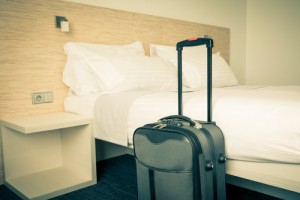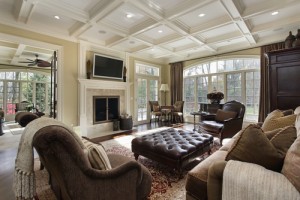Home Insurance
North Carolina home insurance is there to protect you financially when you suffer damage to your home, personal property, and/or personal liability. It is a contract between yourself and an insurance company where you agree to pay a premium to them in exchange for them to pay for damages per your policy.
Home insurance is not a maintenance policy for you to rely on. Part of the responsibility of being a homeowner is to replace items that are worn out such as your roof, heating unit, hot water heater, and more.
There are six main coverage’s that you will see on all home insurance policies:
- Coverage A – Dwelling
- Coverage B – Other Structures
- Coverage C – Personal Property
- Coverage D – Loss of Use
- Coverage E – Personal Liability
- Coverage F – Medical Payments to Others
Coverage A – Dwelling
This will pay to repair or rebuild your home – which includes electrical wiring, plumbing, heating, and air conditioning units – when it suffers damage by a covered cause of loss. When you purchase home insurance the goal of the insurance company is to put you back to the same place before the loss.
The most important item to remember is choosing the right limit of coverage. Often times an individual will want to insure the home for what they paid or what they perceive the value to be. Insurance companies do not take into consideration the market value, appraisal value, or tax value of the home. They want to insure your home for the replacement cost to make sure they can rebuild it back to the way it was.
Independent insurance agents such as us have tools to help guide you with the amount of coverage you need. We use a tool called a replacement cost estimator from companies such as Marshall & Swift or 360 Value to help determine how much a home should be insured for.
There are two examples for why you don’t insure a home for what you paid:
- You don’t insure the land that your home is located on.
- The location of your home can drastically impact how much you actually pay.
Let’s take a 2000 square foot home that was built in 2016 and compare the purchase price between Cary, North Carolina and Topsail Beach, North Carolina. The home you are purchasing in Cary may cost you $280,000 whereas a home beachfront in Topsail Beach may cost you $480,000. You are paying more for the home in Topsail Beach because of where it is located.
Coverage B – Other Structures
This will pay to repair or rebuild any structures that are not attached to your home by a fence, utility line, or similar connection when it suffers damage by a covered cause of loss.
Examples of what is considered Other Structures under your home insurance are:
- Detached garage
- Fences
- Shed
- Gazebo
- Swimming pool
Most home policies will provide either 10% or 20% of your dwelling limit for this coverage. For example, if you insure your home for $300,000, then you will have either $30,000 or $60,000 in Other Structures coverage depending upon the type of home insurance policy you have.
If you have anything that falls under this category make sure that you talk to your independent insurance agent to make sure you have the correct amount of coverage. The last thing you want to encounter when you have a claim is that you didn’t increase the coverage for your detached garage or swimming pool.
Coverage C – Personal Property
This will pay to repair or replace any personal property owned or used by you while it’s anywhere in the world when it suffers damage by a covered cause of loss.
Examples of what is considered personal property are:
 Clothes
Clothes- Furniture
- Electronics
- Appliances
Most home policies will provide either 50% or 70% of your dwelling limit for this coverage. For example, if you insure your home for $300,000, then you will have either $150,000 or $210,000 in Personal Property coverage depending upon the type of home insurance policy you have.
One of the most important things to realize about personal property coverage under your home insurance policy is that the burden of proof is on you as the homeowner. You have to show proof to the insurance company of the items that you owned.
The best way to do that is to take pictures of your home, take a video of your personal property, and document everything. A great tool to use is Know Your Stuff from the Insurance Information Institute that will guide you through the process of categorizing everything. This will make life easier if you ever have to file a claim.
There are some limitations on your home insurance policy when it comes to this coverage for your personal property at other residences you may own, personal property at a self-storage unit, and items such as money, jewelry, firearms, and silverware. You will want to review your policy with your independent insurance agent to see what your home insurance policy provides.
FYI, you want to have a home policy called an HE-7 policy that companies such as Erie Insurance, Kemper Insurance, MetLife Insurance, and Safeco Insurance offers instead of an HO-3 that companies such as Allstate, NC Farm Bureau, Nationwide, and State Farm offer. The Lipstone Insurance Group works with Erie Insurance, Kemper Insurance, MetLife Insurance, and Safeco Insurance to offer our clients the best policy available.
Coverage D – Loss of Use
This will pay for additional living costs you and your family will incur if your home is temporarily uninhabitable while it’s being repaired or rebuilt when it suffers damage by a covered cause of loss.
 Most home policies will provide either 10% or 20% of your dwelling limit for this coverage. For example, if you insure your home for $300,000, then you will have either $30,000 or $60,000 in Loss of Use coverage depending upon the type of home insurance policy you have.
Most home policies will provide either 10% or 20% of your dwelling limit for this coverage. For example, if you insure your home for $300,000, then you will have either $30,000 or $60,000 in Loss of Use coverage depending upon the type of home insurance policy you have.
Your home insurance policy will pay for you to live in a hotel or motel while your home is being repaired or rebuilt and if it it will be an extended period of time it may pay for you to rent an apartment or home.
Coverage E – Personal Liability
This will provide coverage if a claim is made or a suit is brought against you for bodily injury or property damage caused by a covered cause of loss.
A standard home insurance policy will include $100,000 of coverage which is not sufficient.
The Lipstone Insurance Group recommends a minimum of $500,000 or more and the cost is generally $12 a year for this coverage.
 The best part of this coverage is that the cost for the insurance company to defend you is not included as part of your limit of liability. For example, a suit is brought against you and at the end you have to pay the injured party $500,000 and the cost for the insurance company to defend you was $150,000. As long as you have a liability limit of $500,000 your policy will pay the $500,000 you owe the injured party and the insurance company will not charge you the $150,000 to defend you.
The best part of this coverage is that the cost for the insurance company to defend you is not included as part of your limit of liability. For example, a suit is brought against you and at the end you have to pay the injured party $500,000 and the cost for the insurance company to defend you was $150,000. As long as you have a liability limit of $500,000 your policy will pay the $500,000 you owe the injured party and the insurance company will not charge you the $150,000 to defend you.
Coverage F – Medical Payments to Others
This will pay the necessary medical expenses that are incurred or medically ascertained within three years from the date of an accident causing bodily injury by a covered cause of loss.
There are four types of medical expenses that this will cover:
- Medical, surgical, and dental services
- Ambulance, hospital and professional nursing services
- Prosthetic devices, x-rays
- Funeral services
This coverage will typically range from $1,000 to $10,000.
Home Insurance Coverage Options
There are many coverage’s that come as part of your home insurance policy and depending upon the type of home policy you have it will dictate the level of coverage. Here is a list of some of the more popular coverage options that you should consider:
Guaranteed Replacement Cost versus Specified Additional Amount of Coverage A
- Guaranteed Replacement Cost: With this coverage your home insurance policy will pay whatever amount is necessary to rebuild your home in the event of a total loss. There are two very important caveats when it comes to this coverage. 1) You must insure the home for the correct replacement cost when you begin the policy. As I mentioned earlier you will want to complete a replacement cost estimate with your independent insurance agent to determine the correct amount; 2) If you make any improvements, alterations, and/or additions to your home you must notify your independent insurance agent within 30 days of completion if they increase the replacement cost by 5% or more.
- Specified Additional Amount of Coverage A: This coverage will provide either 125% or 150% of Coverage A. For example, if your home insurance policy insures your home for $300,000 and you have 125% Specified Additional Amount of Coverage A you actually have $375,000 to rebuild your home in the event of a total loss due to a covered cause of loss. The downside to this is that if you need more than $375,000 to rebuild your home, then that extra money comes out of your own pocket.
If you are able to obtain a policy that offers Guaranteed Replacement Cost, then do that. It will give you the peace of mind you deserve to know that your home will be rebuilt without the worry of having to use money out of your own pocket.
Primary Mortgage Expense Coverage
- If your home becomes uninhabitable due to a covered claim, then your home policy with pay your primary mortgage for up to 12 months while you are unable to live in it.
- Your home insurance policy will not pay more than the monthly payment at the time of loss. The payment will be made for the shortest time required to repair or replace the damage or, if you permanently relocate, the shortest time required for your household to settle elsewhere.
- The way that your home insurance policy covers this is by using your Loss of Use coverage.
Water Back Up And Sump Discharge Or Overflow
- This coverage can sometimes have an identity crisis. Some insurance companies refer to it as Water Back Up And Sump Discharge Or Overflow, some refer to it as Sewer & Drain Back-up Coverage, and others something else. The important thing to remember is that this is a coverage you should add to your policy.
- This coverage will range from $5,000 to $50,000 depending upon your North Carolina home insurance policy and I would recommend going with the highest coverage possible.
- This coverage is for direct physical loss, not caused by the negligence of an insured, caused by water or water-borne material, which: 1) Originates from within the dwelling where you reside and backs up through sewers or drains; or 2) Overflows or is discharged from a: a) Sump, sump pump; or b) Related equipment; even if such overflow or discharge results from mechanical breakdown. This coverage does not apply to direct physical loss of the sump pump, or related equipment, which is caused by mechanical breakdown.
Inflation Guard
- This coverage comes standard will almost all insurance policies, but it’s a good question to ask your North Carolina independent insurance agent.
- This coverage is there to increase the amount your Coverage A – Dwelling is at each year. On average the inflation guard is between 2-4%, but it varies from insurance company to insurance company.
Scheduled Personal Property
- Many people refer to this as a rider on your home insurance policy. The terminology has changed and is now referred to as scheduling personal property.
- Examples of the different items you may schedule on your home insurance policy:
- Coin collections
- Fine arts
- Firearms
- Golf equipment
- Jewelry
- Musical instruments
- Photography equipment
- Silverware
- Stamp collections
- The insurance company charges you a rate based on every $100 you insure with them. For example, if you have a $10,000 wedding band to insure, the rate is $0.90 per $100, then your annual cost is $90.
- The benefit to doing this is you don’t have a deductible to worry about paying, but make sure to talk to your independent insurance agent before filing a claim.
What home insurance does not cover
There are many types of damage that is not covered by your home insurance policy and you can find them listed under the exclusions part of your home insurance policy:
- Earth movement
- Water
- Power failure
- Nuclear hazard
- Intentional loss
- Damage caused by birds, vermin, rodents or insects
- Damage caused by animals owned
There are additional types of damage that may not be covered by your specific home insurance policy. I would highly recommend that you ask your independent insurance agent and review your policy once you receive it in the mail.
What questions should I ask before buying home insurance
What type of home policy am I buying?
This may be the most important question that you may never ask an independent insurance agent when buying home insurance. With several different options available from your standard HO-3 policy to the more comprehensive HE-7 policy this is where the rubber meets the road so to speak.
In North Carolina all insurance companies that offer home insurance provide the standard HO-3 policy. However, not all insurance companies offer the more comprehensive HE-7 policy.
When you are talking with an independent insurance agent, or any insurance agent/company, the first question you ask them is, “What type of home policy am I buying?” If they only offer the HO-3 policy you may want to move onto a different company that offers the more comprehensive HE-7 policy.
Can I get replacement cost for the dwelling and personal property?
This is not as large of a concern since almost all home insurance policies do provide replacement cost for the dwelling and the personal property, but it’s vitally important that you confirm this.
There are two ways an insurance company provide coverage regarding this question. The first is Replacement Cost and the second is Actual Cash Value. You want to have Replacement Cost coverage.
Replacement cost coverage means the cost to repair or replace damaged property with like kind and quality of materials without depreciation.
Actual cash value coverage means the cost to repair or replace with like kind and quality of materials with depreciation.
For example, your house is broken into and the only property that was damaged or stolen involved your television. If you have replacement cost coverage, then your insurance company would give you the money to go out to buy a brand new television of like kind and quality. If you have actual cash value coverage, then your insurance company would give you the money for what it was the day it was stolen.
By having replacement cost coverage on your policy you won’t have to worry about paying for items out of your own pocket that are damaged or destroyed.
Am I required to buy flood insurance, and if so where can I buy flood insurance?
If you are purchasing a home that requires a mortgage, then your mortgage company will check to see if you are in a moderate to high risk flood zone. Every home in the United States is located in a flood zone, it just depends upon what type of flood zone your home is located in.
A Flood Zone X means you are in the lowest risk flood zone and a Flood Zone A or V means you are in the highest risk flood zone. If you are in either a Flood Zone A or V, then you’ll be required to purchase flood insurance if you have a mortgage on your home.
The majority of the time when you purchase flood insurance it will be the NFIP, National Flood Insurance Program. The maximum amount of coverage you’ll be able to purchase is $250,000 for your dwelling and $100,000 for your personal property. You can purchase additional coverage through a private flood insurance company if you need that additional coverage.
What are common things that could make me ineligible for home insurance?
All home insurance companies have different underwriting guidelines that will dictate whether you are eligible to purchase home insurance from them. Here is a list of the common items that come up for discussion:
- What year was the home built?
- When was the roof replaced?
- When was the heating unit replaced?
- When was the wiring replaced? What type of wiring do you have?
- When was the plumbing replaced? What type of plumbing do you have?
- Do you have a trampoline?
- Do you have a swimming pool?
- Do you have any pets? If so, what type and breed?
- Have you filed any home insurance claims in the past three to seven years?
- Do you operate a business out of your home? If so, what type of business?
Depending upon the insurance company you are working with they may have additional requirements or questions for you.
What type of deductible do you offer?
This has become a hot topic in the North Carolina home insurance market in the past several years. Several home insurance companies are now providing what is called a Split Home Deductible.
What a split home deductible means is that you have one deductible for any wind/hail claims and one deductible for any other claims.
This is very important for you to know if you have a separate deductible for any wind/hail claims. Often people will not find out about these deductibles until a claim is filed.
Make sure you ask your independent insurance agent if you have split home deductible.
Is earthquake damage covered by home insurance?
As you’ll recall from prior earthquake is not covered by your home insurance. Unlike flood insurance where you have to buy a separate policy you can add earthquake coverage to your home insurance policy.
When you add this coverage to your North Carolina home insurance policy typically has a 5% deductible and that 5% is based upon your dwelling limit. For example, your dwelling is insured for $300,000, then your deductible is $15,000.
FYI, it will not cover the exterior of your home if it is masonry veneer.
Quick recap
Your North Carolina home insurance is there to protect your dwelling, other structures, personal property, loss of use, personal liability, and medical payments.
Not all North Carolina home insurance policies are created equal and it is vitally important that you talk to a North Carolina independent insurance agent to get the coverage you need, the experience you deserve, and all at a fair price.

 Clothes
Clothes